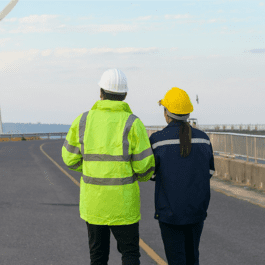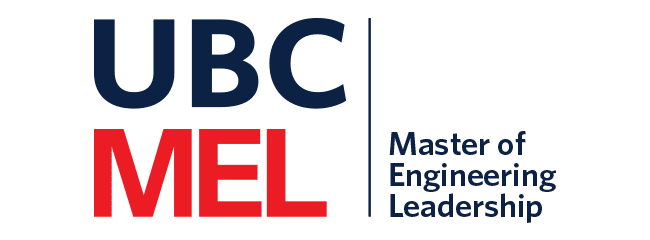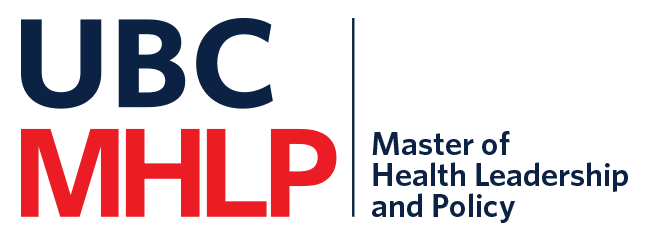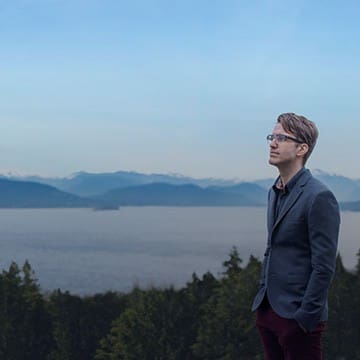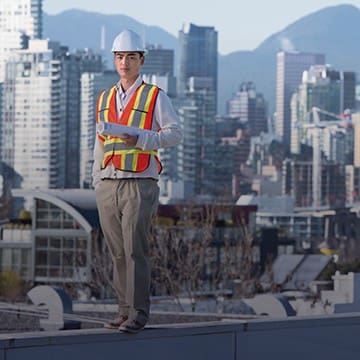Research to Action: Advancing Urban Sustainability
MEL students solving real-world sustainability problems
MEL students participated in the “Research to Action: Advancing Urban Sustainability” conference
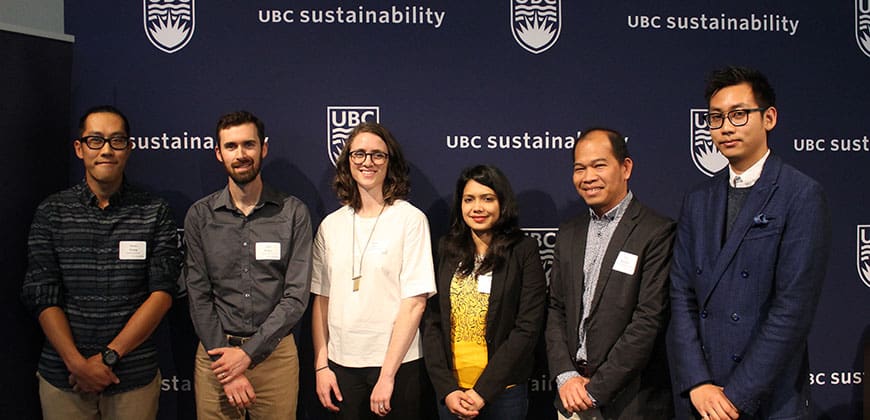
Six students in the MEL in Clean Energy Engineering and one student in the MEL in Urban Systems program presented their sustainability projects in the “Research to Action: Advancing Urban Sustainability” conference hosted by UBC Sustainability and Greenest City Scholars, on September 27, 2017.
As part of their coursework, the MEL students support local governments and institutions across BC to future-proof people cities and urban spaces. At the conference, they presented knowledge, methodologies and outcomes of their applied research projects to a mixed audience consisting of representatives of local companies, institutions and UBC staff and students. Furthermore, Sean Pander, Green Buildings Program Manager at the City of Vancouver, shared his views as a keynote speaker on “Vancouver’s Zero Emissions Building Plan: Insights into Catalyzing Transformational Change.”
About the UBC Sustainability Scholars Program
The UBC Sustainability Scholars Program facilitates paid internship opportunities for UBC graduate students, from all academic disciplines. Each successful student applicant works on a specific project on a part-time basis over the summer term from May through August. The projects are designed to be completed within 250 hours for which Scholars receive $20 per hour. An information session for UBC’s Sustainability Scholars program takes place on January 18, 2018. Register here.
Overview of the MEL student projects
UBC Sustainability Scholars project reports can be downloaded on the Project Library and cover a variety of urban sustainability themes, including climate and energy, green buildings, zero-waste, transportation, food and wellbeing.
Project 1: Electric Vehicle Building Code Requirements Implementation Survey
Swathi Bhat, MEL in Clean Energy Engineering student
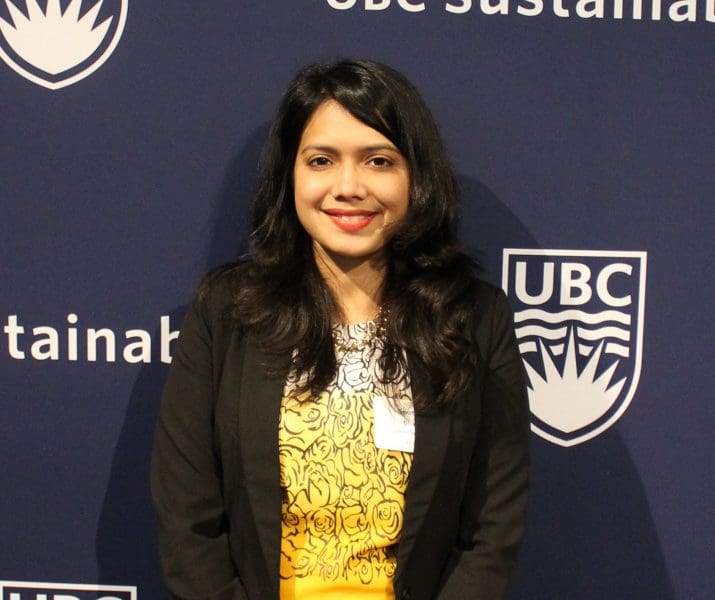 The City of Vancouver was the first jurisdiction in North America to require electric vehicle (EV) charging infrastructure in new homes. In 2013, the City of Vancouver passed a requirement that all parking garages in one- and two-family dwellings, and each one of 20% of the parking stalls in multi-family buildings be equipped with a dedicated EV charging circuit rated at 240V, 40A.
The City of Vancouver was the first jurisdiction in North America to require electric vehicle (EV) charging infrastructure in new homes. In 2013, the City of Vancouver passed a requirement that all parking garages in one- and two-family dwellings, and each one of 20% of the parking stalls in multi-family buildings be equipped with a dedicated EV charging circuit rated at 240V, 40A.
The impetus for requiring EV charging infrastructure in new buildings is because the cost of retrofitting an existing building is approximately two-and-a-half-times more expensive than that incurred during initial construction. More importantly, as access to home charging is considered a key enabler of EV uptake, the City of Vancouver has utilised its building code to ensure that a key barrier is removed.
I worked as a part of the climate policy division, where I helped quantify the effectiveness of the EV infrastructure policies mandated by the City of Vancouver as a part of their award-winning Greenest City 2020 Action Plan. The project involved understanding the plan checking and building permit issue process, extracting a database of all buildings that are required to be equipped with EV charging infrastructure, conducting electrical inspections of a subset of buildings that meet the criteria, and recommending pragmatic corrective actions for the City of Vancouver to implement during the next revision of the Vancouver Building By-Law.
Having previously worked on the electrification of railway infrastructure within a highly regulated environment, it was refreshing to be able to play a key role in painting the future of a growing mode of electrified transportation. Currently, I am building upon my previous work by developing a scalable business model to increase the deployment of DC fast-charging electric vehicle infrastructure at the provincial level.
Project 2: Identifying Opportunities to Improve Sustainable Material Use in Engineering Operations
Kevin Chen, MEL in Urban Systems student — Partner organization: City of Vancouver, Engineering Operations
The City of Vancouver wants to become the greenest city in the world by 2020. To support this vision, the City developed the Greenest City 2020 Action Plan. For City Engineering Services, they have set their targets to reduce greenhouse gas emissions, divert solid waste and meet or beat air quality guidelines. As part of the UBC Sustainability/Greenest Scholars Program, this project benchmarked the existing use of sustainable engineering materials, researched best-practices in other cities and identified areas for improvement.
For the three engineering materials (asphalt, concrete and aggregate) studied, supply-chains were mapped out and five improvement areas were identified:
- Sustainable Procurement Requirements
- Use of Reclaimed Asphalt Pavement for Paving
- Use of Warm-mix Asphalt for Paving
- Reclaimed Roadbase for Backfilling
- Supplementary Cementitious Materials for Concrete
Business process improvements were identified to improve sustainable material use, reduce cost and increase productivity. Dialog was established with City of Yokohama (Japan) to share experience on asphalt recycling. In addition, Kevin recommended several initiatives to implement comprehensive sustainability requirements in the supply chain. The project findings have been used to supported infrastructure advisory work on City Engineering Operations improvement.
Project 3: Taking a Portfolio Approach to Financing Energy Efficiency in Industrial Building — A Feasibility Study
Bruce Duong, MEL in Clean Energy Engineering student — Partner organization: Vancouver Economic Commission
This feasibility study identified a portfolio of nine businesses and buildings that were broad and diverse in terms of business types and building uses. The cost savings of moving forward with a group is estimated at 20-30% of the total identified investment cost as opposed to moving forward individually.
This study shows that there is a cost benefit to a portfolio approach by being able to leverage a single technical partner to design and install energy efficiency retrofits for a group of businesses. A number of financing options were explored for this pilot portfolio, including engaging with local partners, commercial lender and larger national energy efficiency funds. Based on the cost benefit, there is a motivation to support a portfolio based approach; however, the actual costs of administration, business engagement and management provide by the Vancouver Economic Commission and other partners would have to factored into the potential cost savings to ensure that there is a positive net benefit.
In order to access larger energy efficiency financing options such as CoPower and Efficiency Capital, it is necessary to increase the size and scale of a retrofit investment portfolio to a threshold of around $500,000, indicating that additional work may need to be completed to develop a portfolio that can attract this type of financing.
Project 4: Heat Pump Retrofit Technical Considerations, Costs, and Business Case for Multi-Family Building Archetypes
Colin Mingus, MEL in Clean Energy Engineering student — Partner organization: City of Vancouver
The City of Vancouver is developing a low carbon retrofit strategy which will help achieve its target of 100% renewable energy in buildings by 2050; and heat pumps could play a key role, as they are powered by low carbon electricity. The purpose of this study was to analyze the technical barriers facing low carbon heat pump retrofits in multi-unit residential buildings (MURBs), and to define MURB archetypes and determine which heat pump retrofits would be appropriate in each archetype.
The main technical barriers for centralized heat pumps were found to be twofold: 1) heat pumps with modern refrigerants cannot efficiently lift water temperatures to the same temperatures as traditional boilers and 2) the electrical capacity of existing MURBs is often insufficient to support the large power draw required by large centralized heat pumps.
Multiple heat pump retrofit technologies were compared based on their impact on building CO2 emissions and their financial performance. Modeling showed the highest CO2 reductions were possible with packaged terminal heat pumps, which pose maintenance challenges due to the distributed nature of the system; while the best financial performance was from CO2 domestic water heat pumps, which are currently not available at MURB scale. While there is no single technology that is a clear “winner”, developments in new refrigerants may make a fuel switch economically viable for MURBs in the coming years.
Project 5: GHG Emissions Reduction Potential of Energy Step Code Scenarios — City of Maple Ridge
Thi Nguyen, MEL in Clean Energy Engineering student
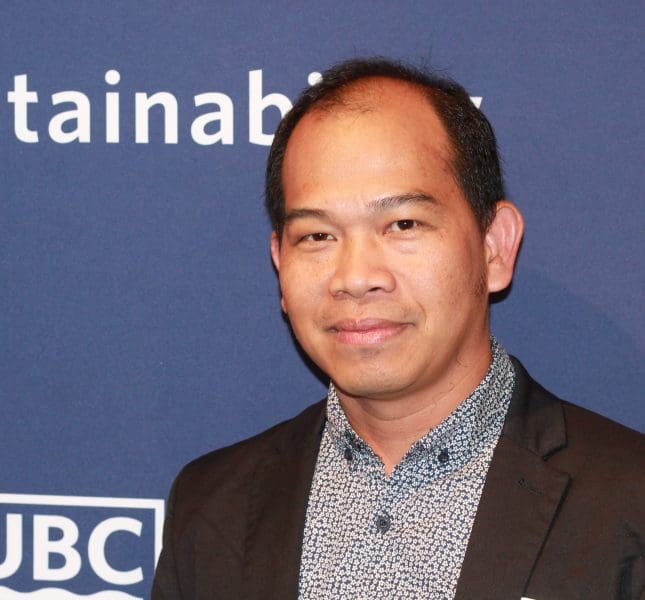 Coming into force in April 2017, the BC Energy Step Code is a voluntary roadmap that establishes progressive steps to transition to constructing net-zero energy-ready buildings by 2032. The City of Maple Ridge is exploring the potential to use this optional roadmap to encourage more energy-efficient buildings, and at the same time reduce GHG emissions in the city. In addition to following the development of resources and studies undertaken by the Province and BC Housing, the City is collaborating with the UBC Sustainability Scholars Program to implement the “GHG Emissions Reduction Potential of Energy Step Code Scenarios” project, with the support of BC Hydro.
Coming into force in April 2017, the BC Energy Step Code is a voluntary roadmap that establishes progressive steps to transition to constructing net-zero energy-ready buildings by 2032. The City of Maple Ridge is exploring the potential to use this optional roadmap to encourage more energy-efficient buildings, and at the same time reduce GHG emissions in the city. In addition to following the development of resources and studies undertaken by the Province and BC Housing, the City is collaborating with the UBC Sustainability Scholars Program to implement the “GHG Emissions Reduction Potential of Energy Step Code Scenarios” project, with the support of BC Hydro.
Key project components included: 1) developing possible scenarios for the adoption of the BC Energy Step Code in Maple Ridge; 2) modeling energy and GHG emissions reductions for each scenario; and 3) creating a GHG modelling tool in Excel for development planning purposes.
The project identified how the City of Maple Ridge can leverage the Step Code to fulfill its long-term target of reducing GHG emissions as effectively as possible. The project also identified areas needing attention or amendment so as to effectively implement the Step Code. These gaps include the need for additional research to identify a comprehensive impact of the Step Code and a training program to support implementation efforts. In addition, energy modeling and energy data collection in the City should be changed to align with the defined Step Code metrics.
Project 6: Environmental and Social Impact Partnership — An Academic and Business Skills-Matchmaking Framework
Kerry Shaw, MEL in Clean Energy Engineering student — Partner organization: Vancouver Economic Commission
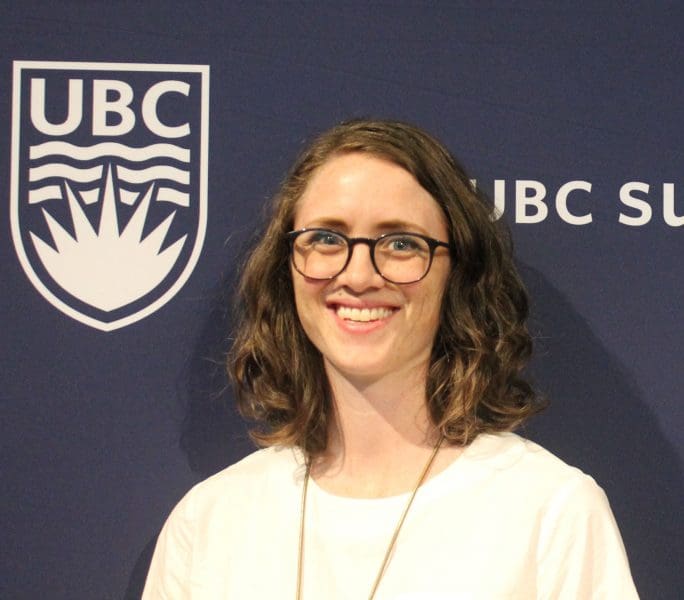 The Vancouver Economic Commission (VEC) is committed to helping Vancouver reach its Greenest City 2020 Action Plan (GCAP) goals. Specifically, the VEC is responsible for the Green Economy goal and its targets to both double the number of businesses engaged in ‘greening’ their operations and to double the number of green jobs between 2010 and 2020. To that end, the VEC has been informally matching Vancouver’s small and medium sized enterprises (SMEs) with various academic programs over the past several years. This is in addition to their efforts supporting CityStudio programming. These matches provide capacity to enable SMEs to tackle environmental and social challenges.
The Vancouver Economic Commission (VEC) is committed to helping Vancouver reach its Greenest City 2020 Action Plan (GCAP) goals. Specifically, the VEC is responsible for the Green Economy goal and its targets to both double the number of businesses engaged in ‘greening’ their operations and to double the number of green jobs between 2010 and 2020. To that end, the VEC has been informally matching Vancouver’s small and medium sized enterprises (SMEs) with various academic programs over the past several years. This is in addition to their efforts supporting CityStudio programming. These matches provide capacity to enable SMEs to tackle environmental and social challenges.
This project involved exploring formalized programming options to facilitate these academic/business partnerships at the VEC. Three potential skills-matching programs were presented. The trajectory, required resources, business model, risks, and anticipated outcomes were outlined for each option. Two of the three options were recommended for implementation to provide resources for the varied challenge types that exist.
Project 7: Developing a Community Solar Garden
Ryan Voon, MEL in Clean Energy Engineering student — Partner organization: City of New Westminster
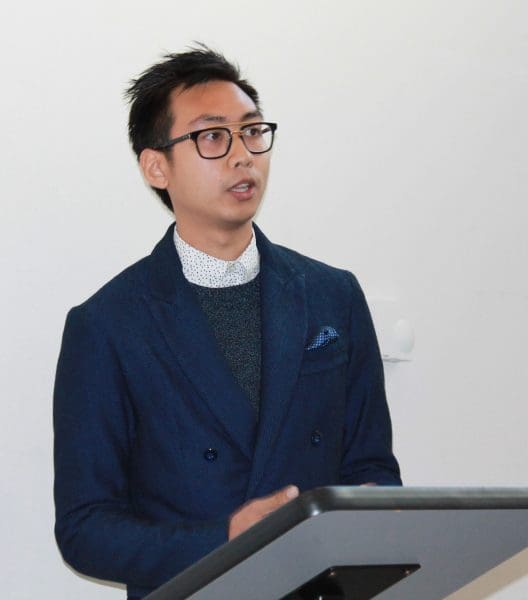 A community solar garden is a centrally-located and centrally operated solar PV system where community members, including residents, businesses, and not-for-profit organizations, can subscribe to a portion of the electricity generated. The electricity generated from the installation is credited back to the subscriber’s electricity bill in proportion to their share of the community solar garden.
A community solar garden is a centrally-located and centrally operated solar PV system where community members, including residents, businesses, and not-for-profit organizations, can subscribe to a portion of the electricity generated. The electricity generated from the installation is credited back to the subscriber’s electricity bill in proportion to their share of the community solar garden.
The City of New Westminster is exploring this innovative concept to help make solar energy more accessible to its residents, as interested residents would not need to install solar panels on their own rooftops.
Community interest and participation is key to the overall success of this project, and we created a variety of marketing and communications initiatives to spread awareness of the project. This included print ads, billboards, social media campaigns, and a one-minute overview video. Two public information sessions were also organized to gather feedback from the New Westminster community
To understand the level of interest in the initiative, we launched a 30-day pre-sale period for panel subscriptions in late October 2017. By the end, over 96% of the available subscriptions were pre-sold. Subject to council approval, this project will move toward design, engineering, and construction, with an expected completion date in 2018.
The final sustainability scholar report will provide an overview of the community solar garden, and recommend best practices for municipalities, businesses, or non-profit organizations looking to develop their own solar gardens.
For further developments on the New Westminster Urban Solar Garden, please visit energysavenewwest.ca
Application Deadlines
The online application portal for the January 2025 has closed.
Get ready to apply!
Admissions for the 2026 intake will open on January 1, 2025.
How to ApplyClean Energy Engineering
Develop the technical, business and leadership skills needed to generate sustainable energy solutions.
Read More